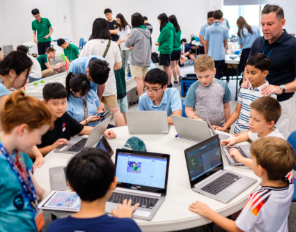In today’s connected world, being digitally literate is just as important as knowing how to read or write. Whether you’re a student, a teacher, or simply someone eager to keep up with technology, improving your digital skills can open doors in learning, communication, and problem-solving. And the good news? Your study habits can make all the difference.
Here are some helpful study habits that gently boost digital literacy in daily life:
1. Set Time for Purposeful Digital Exploration
Instead of scrolling aimlessly, dedicate specific study time to explore educational tools or platforms. Try learning something new each week—maybe how to use a digital calendar, format a document, or safely search online. Making digital exploration part of your routine keeps your skills growing steadily.
2. Take Notes on Tech Tools You Use
Each time you use a new app or online tool, jot down what it does and how you used it. Keeping a simple “digital journal” can help you retain what you learn and build confidence when using different technologies.
3. Practice Typing and Shortcut Skills
Improving your typing speed and learning basic keyboard shortcuts can save you tons of time. Practice a little each day through free typing websites or by creating your own writing challenges.
4. Watch Educational Videos Mindfully
Watching short how-to videos about safe internet use, document creation, or online communication is a great way to learn visually. Just be sure to choose videos from reliable and age-appropriate sources.
5. Use Flashcards to Learn Tech Terms
If you find yourself confused by words like “URL,” “cloud storage,” or “browser extension,” make flashcards! This classic study habit works wonders for remembering modern vocabulary.
6. Practice Problem-Solving with Online Tasks
Try figuring out how to do tasks like resizing images, organizing files, or formatting text. Give yourself small challenges—like creating a newsletter or building a simple slide presentation. Solving these on your own helps build digital confidence.
7. Join Online Learning Communities
Many platforms and forums offer helpful discussions about learning technology. Reading or participating in respectful, supportive communities can help you learn through others’ experiences.
8. Reflect on What You’ve Learned
At the end of each week, write a short summary of what you practiced digitally. This reinforces your learning and shows you how far you’ve come.
Conclusion
Digital literacy isn’t about mastering everything at once—it’s about building comfort and skill step by step. With these friendly study habits, you’ll slowly grow more confident navigating the digital world. Whether you’re studying for school, work, or personal goals, stronger digital habits help you stay informed, efficient, and ready for the future.














